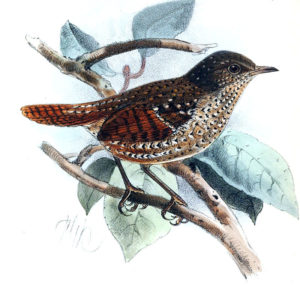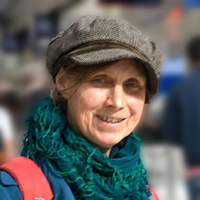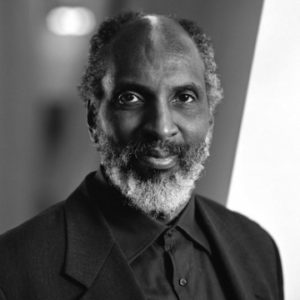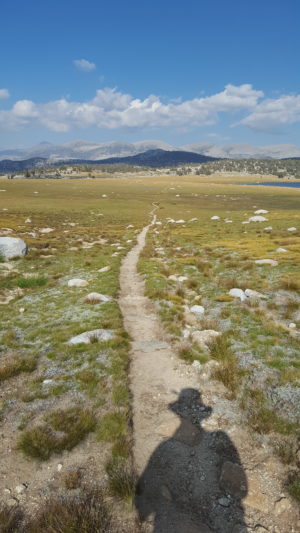Preview
In this issue, we announce the start of registration for this year’s Annual Fall Workshop, coming up on November 3, and provide a look at the themes Cynthia Bourgeault will be exploring that day.
We also provide information about a number of other upcoming events and retreats in the Chicago area and around the region, including two that are scheduled for mid-July: a “level two” Enneagram worshop in St. Charles and Advanced/Post-Intensive Retreats in Benet Lake, Wisconsin. This month’s Insights come from Wendell Berry, Henry David Thoreau, Sharon Salzberg and the Rig Veda.
Alan Krema offers a reflection on the topic of Opening Race Into a Question of Belonging, based on an “On Being” podcast that discussed the ideas of John Powell. This issue also includes the fourth chapter of Phil Jackson’s Spirit in the Wild – a ongoing reflection on Phil’s solo wilderness journey in the High Sierras last year.
Please let us know what you think about Spirit Journal – and start your side of the conversation – by emailing the editor at the address provided at the end of the newsletter. We look forward to hearing from you!
Early Bird Registration Starts Now for Our Seventh Annual One-Day Fall Workshop November 3 in Lisle!
This Year’s Fall Workshop Features Cynthia Bourgeault. Her Focus: How Wisdom Work Can Help Extend and Deepen Our Transformation in Centering Prayer
 Registration for our seventh annual fall workshop is now open. Sign up now to take advantage of Early Bird pricing. You may register online or download and print this mail-in form.
Registration for our seventh annual fall workshop is now open. Sign up now to take advantage of Early Bird pricing. You may register online or download and print this mail-in form.
This year’s Fall Workshop will bring renowned author and teacher Cynthia Bourgeault to Benedictine University in Lisle to offer a full day of wisdom teachings. The Workshop will explore Christian Wisdom as Prophecy: An ongoing conversation between Centering Prayer and Wisdom tradition.
The Wisdom tradition as taught by Cynthia references practices learned and developed over many centuries that include recognition and utilization of our entire being and not simply rational thought. Wisdom teaches that perception and awareness are unitive experiences, not merely thought processes.
Centering Prayer is a core element of the Wisdom tradition — it teaches us to release the thinking mind’s dominance over us. Thought will grip on to fear and cling to imagined desiring. The Wisdom tradition offers effective means to help us release our thoughts, so that we can simply rest in the presence of the divine nature dwelling in each of us. Wisdom practices cultivate an openness to presence, gradually enabling deeper levels of contemplation in centering prayer.
The Wisdom tradition also helps develop deeper awareness and higher levels of being outside of meditation time. During daily activity we engage practices to continually return to the awareness of our whole being, again releasing the dominance of the rational mind. These practices help develop a more constant contemplative approach to life when one isn’t meditating.
This is the Wisdom tradition’s link to the Welcoming Prayer. We will explore wisdom work as a training program that helps a person achieve and maintain the attitude Thomas Keating calls “welcoming receptivity,” which invites God to proceed with the process of transformation.
Looking ahead in a prophetic way, following our experiences with our whole being, we look to engage our oneness with all of humanity. Wisdom can help us move from an individual experience of the divine nature within, to an experience that we are all in union with each other and can communally experience our common divine nature embedded within us.
About Cynthia Bourgeault

The Rev. Dr. Cynthia Bourgeault is a modern-day mystic, Episcopal priest, writer, and internationally known retreat leader.
Cynthia divides her time between solitude at her seaside hermitage in Maine and a demanding schedule traveling globally to teach and spread the recovery of the Christian contemplative and Wisdom path. She has been a long-time advocate of the meditative practice of Centering Prayer and has worked closely with Thomas Keating. For more information about Cynthia’s ideas and her many books, visit her website.
Upcoming Events, Retreats, and Conferences
Here are some additional upcoming contemplative activities that may be of interest:
Ongoing Centering Prayer “11th Step” Programs in Northfield and Chicago
In AA 12-step programs, the 11th step is making a personal effort to get in touch with a Higher Power, however one understands it. Increasingly, people in 12-Step programs are deepening their relationships with their Higher Power using the method of Centering Prayer.
Here in the Chicago area, two Centering Prayer-based 11th step groups have formed. One meets on Sundays, 4:30-5:15, at 319 Waukegan Road in Northfield. For more information, please contact Leonette Kaluzny – leonettekaluzny@aol.com.
Another Centering Prayer 11th step program meets on Fridays at 6:45pm in conference room “C” on the 7th floor of the Community First Medical Center, 5645 W. Addison Street, Chicago. For further information on this program, please contact Philip Lo Dolce — stuffer1@ameritech.net.
Healing Gardens 2018 Programs Include Introductory Centering Prayer Workshops and Enneagram Workshops
 Healing Gardens at Stonehill Farm invites you to enjoy two acres of perennial gardens in a quiet wooded setting in St. Charles. A growing list of contemplative activities take place at Healing Gardens, including the following:
Healing Gardens at Stonehill Farm invites you to enjoy two acres of perennial gardens in a quiet wooded setting in St. Charles. A growing list of contemplative activities take place at Healing Gardens, including the following:
Level Two Enneagram Workshop, Saturday July 14, 8:45am – 3:30pm
Introductory Centering Prayer Workshop, Saturday August 4, 8:45am – 3:00pm
Silent Saturday, August 18, 9:00am – noon
For more information and registration, please visit the Healing Gardens website.
July 15-22: Advanced/Post-Intensive Retreats, Benet Lake, Wisconsin
Contemplative Outreach of Southeast Wisconsin offers this year’s eight-day retreat July 15-22 at St. Benedict’s Abbey and Retreat Center in Benet Lake, Wisconsin.
The retreats, guided by Kathryn Ann Kobelinski, SSND and Ann Koerner, CSA, will immerse participants in the practice of Centering Prayer as taught by Contemplative Outreach, Ltd. These Advanced/Post Intensive retreats allow participants to come together for Centering Prayer, Lectio Divina and meal times. They provide an atmosphere of silence, solitude and community.
For further information, please contact Sr. Kathryn Ann at 414-282-7310 or kkobelinski@ssndcp.org. To register, use this mail-in form.
In Kansas City: A Retreat with Ilia Delio on Christianity as a Planetary Faith: Engaging Teilhard’s Vision, July 20-21
This will be the inaugural retreat sponsored by the Omega Center, founded by Ilia Delio OSF, a Franciscan Sister, respected academic and theologian, and author of seventeen books. She is an internationally sought-after presenter, speaking on the intersection of Science and Religion, with particular interests in evolution, ecology, and artificial intelligence. With a focus on Teilhard de Chardin’s pioneering vision, the retreat will explore such questions as: Is Christianity old and tired or does it have an inner power to transform the world? What does an evolutionary Christianity mean for the planet today? Brie Stoner and Matthew Wright will also be featured speakers. Click here for further information and registration.
Midwest Wisdom Schools in Dubuque Iowa in August and October
If you are longing to go deeper in your Centering Prayer practice, and perhaps yearning for a community of like-hearted seekers, you are invited to participate in one or more Wisdom Schools being offered next year at the Shalom Spirituality Center in Dubuque:
August 6-9, 2018 Surrendering Into Presence (Centering Prayer and Non-duality)
Oct 15-18, 2018 Placing Our Mind in Our Heart (Introductory Level Wisdom School, Part A)
These Wisdom schools are led by Beth O’Brien, Benedictine oblate and Founder of Contemplative Presence. A long-time Centering Prayer practitioner, Beth has been a direct student of Cynthia Bourgeault. In 2014, she received Cynthia’s blessing to teach and carry forth the Wisdom lineage. Beth led a one-day workshop on Mary Magdalene that was part of Contemplative Outreach – Chicago’s Living Wisdom Series earlier in 2017. For more information & registration, please visit the Contemplative Presence website.
Opening Race Into a Question of Belonging
by Alan Krema

Last month, Krista Tippet talked with John Powell on her wonderful NPR program and podcast, “On Being.” John Powell is the director of the Haas Institute for a Fair and Inclusive Society and professor of Law, African American, and Ethnic Studies at the University of California, Berkeley. The conversation, which you can listen to here, inspired Alan Krema to write the following reflection. Alan is the coordinator of Contemplative Outreach Chicago.
After listening to Krista Tippet interview John Powell with the theme of “Opening the Question of Race to the Question of Belonging,” I was struck by how many of John Powell’s ideas and articulations were very similar to the fruits of the Spirit that we experience in the work of a steady and continual centering prayer practice.
Powell’s starting point is that race is like gravity – felt and experienced by all but understood by few.
Similarly, we all share in a basic core of goodness and the love and sustenance of a divine nature, but few of us come to know that we live in this reality, or perhaps many of us spend too little time in conscious awareness that we exist in this sacred domain. There is so much to our reality that is hidden and unspoken, and only in the work of opening ourselves through the regular practice of contemplation, do we come to experience a reality larger than the one our mind can know by itself.
So, I decided to take the ideas expressed in this interview and translate or correlate them with the teachings of centering prayer, which we all have heard expressed in various ways, particularly in Thomas Keating’s Spiritual Journey talks. There is often, in our Contemplative Outreach circles, discussion of how the practice of meditation can lead us to a life of action needed to address the social issues of our time. As described in the interview, coming to understand the larger realities is really the key question we need to face. The details of action, based on our calling to attend to the divine presence and action within, will arise from our work and attentiveness.
Spirit in the Wild Chapter 4 – Silence, Solitude, Solidarity, Stillness, and Simplicity
by Phil Jackson
Last year, Phil Jackson (until 2016 the coordinator of Contemplative Outreach – Chicago) went on a two-week solo backpacking trip in the High Sierras of California. It was a spiritual journey as well as a physical challenge, and it became a surprisingly intense experience. Phil has now documented his journey in writing. If you want to start at the beginning, go to the March issue of Spirit Journal. Here is Chapter 4:

“Realize ourselves as part of nature,” says Trappist author Thomas Merton[1]. Human nature—our ability to be our natural selves—emerges clearly in a natural setting. After a few days in a simple routine of repeated tasks: eat; walk; sleep, this glorious planet brings us unavoidably to a contemplative state.
Thomas Keating wrote about the “Unfolding of Centering Prayer” in the December 2017 Contemplative Outreach newsletter. Contemplation continually develops, he wrote, through at least five qualities: Silence, Solitude, Solidarity, Stillness, and Simplicity. These same qualities are present in solo backpacking. We move along this path at home in Centering Prayer, but in larger, perhaps more complete ways in backpacking in the wild.
The Silence in the wild is complete and unending. Birdsong, wind, rushing water and the echo of our footsteps, all being natural, gently punctuate the sound of silence rather than break it. Nothing from the outside distracts us from our simple focus and existence, and soon our interior is silent, in solidarity with our present day and our surroundings. As Keating says about Centering Prayer, in the solitude we “disregard the endless conversation we have with ourselves and rest in the experience of God’s presence.” We leave behind so much, we die to those needs, to our daily life; but this is a happy death because those needs, newly recognized as “unneeded needs,” are replaced with the abundance of all of creation. We die to those identities we have at home: our job; our social standing; our church. The hardest to die to for me was as a father, which gives me the greatest contentment, but in the wilderness, other than a wallet-sized family photo, I have no contact with them. With such a death from our identity and possessions comes rebirth, like the proverbial mustard seed growing to an enormous new creation. The silence moves us, as Keating says, first “into solitude then into stillness . . .the habitat of contemplative prayer. (There, with) the inflowing of God into our souls” we are still, in contemplation, “the natural state of human consciousness, of which the Garden of Eden in Genesis is a symbol.” How much closer to the Garden of Eden—this symbol of contemplation and natural consciousness– can we get than when we are “alone” in pristine wilderness?
Insights
And the world cannot be discovered by a journey of miles, no matter how long, but only by a spiritual journey, a journey of one inch, very arduous and humbling and joyful, by which we arrive at the ground of our feet and learn to be at home.
– Wendell Berry
Heaven is under our feet as well as over our heads.
– Henry David Thoreau
We can travel a long way and do many things, but our deepest happiness is not born from accumulating new experiences. It is born from letting go of what is unnecessary, and knowing ourselves to be always at home.
– Sharon Salzberg
So what are we to say about God? If you have fully grasped what you want to say, it isn’t God. If you have been able to comprehend it, you have comprehended something else instead of God.
– The Rig Veda
Your Turn
Please write in to comment on or add to any of the items in this month’s newsletter. Let us know if you are aware of an upcoming event you think others should know about, or send us an inspirational quote you’d like to share, or information about a book, website, podcast, or video you recommend. You are invited to contribute by emailing the newsletter editor at news@centeringprayerchicago.org.